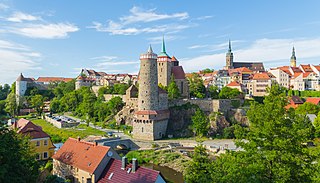
The Sorbian languages are the Upper Sorbian language and Lower Sorbian language, two closely related and partially mutually intelligible languages spoken by the Sorbs, a West Slavic ethno-cultural minority in the Lusatia region of Eastern Germany. They are classified under the West Slavic branch of the Indo-European languages and are therefore closely related to the other two West Slavic subgroups: Lechitic and Czech–Slovak. Historically, the languages have also been known as Wendish or Lusatian. Their collective ISO 639-2 code is wen.

Saxony, officially the Free State of Saxony, is a landlocked state of Germany, bordering the states of Brandenburg, Saxony-Anhalt, Thuringia, and Bavaria, as well as the countries of Poland and the Czech Republic. Its capital is Dresden, and its largest city is Leipzig. Saxony is the tenth largest of Germany's sixteen states, with an area of 18,413 square kilometres (7,109 sq mi), and the sixth most populous, with more than 4 million inhabitants.

Sorbs are a West Slavic ethnic group predominantly inhabiting the parts of Lusatia located in the German states of Saxony and Brandenburg. Sorbs traditionally speak the Sorbian languages, which are closely related to Czech and Lechitic languages. Upper Sorbian and Lower Sorbian are officially recognized minority languages in Germany.

Lusatia is a historical region in Central Europe, territorially split between Germany and modern-day Poland. Lusatia stretches from the Bóbr and Kwisa rivers in the east to the Pulsnitz and Black Elster rivers in the west, and is located within the German states of Saxony and Brandenburg as well as in the Polish voivodeships of Lower Silesia and Lubusz. Major rivers of Lusatia are the Spree and the Lusatian Neisse, which defines the border between Germany and Poland. The Lusatian Mountains of the Western Sudetes separate Lusatia from Bohemia in the south. Lusatia is traditionally divided into Upper Lusatia, the hilly southern part, and Lower Lusatia, the flat northern part.
British literature is from the United Kingdom of Great Britain and Northern Ireland, the Isle of Man, and the Channel Islands. This article covers British literature in the English language. Anglo-Saxon literature is included, and there is some discussion of Latin and Anglo-Norman literature, where literature in these languages relate to the early development of the English language and literature. There is also some brief discussion of major figures who wrote in Scots, but the main discussion is in the various Scottish literature articles.

Bautzen or Budyšin, until 1868 Budissin in German, is a town in eastern Saxony, Germany, and the administrative centre of the district of Bautzen. It is located on the Spree river, is the eighth most populous town in Saxony, and is the seat of Saxony's largest district. Bautzen lies in the bilingual Sorbian settlement area of Lusatia, and is Lusatia's third-largest town after Cottbus and Görlitz, as well as the second-largest town in Upper Lusatia.
Serbian literature, refers to literature written in Serbian and/or in Serbia and all other lands where Serbs reside.

Lower Lusatia is a historical region in Central Europe, stretching from the southeast of the German state of Brandenburg to the southwest of Lubusz Voivodeship in Poland. Like adjacent Upper Lusatia in the south, Lower Lusatia is a settlement area of the West Slavic Sorbs whose endangered Lower Sorbian language is related to Upper Sorbian and Polish.

Jurij Brězan was a Sorbian writer. His works, especially the novels, narrative works and children's books, were available in the two languages German and Upper Sorbian.

Michal Snunit is an Israeli journalist, magazine editor, poet and author of books for children.

Räckelwitz (German) or Worklecy is a municipality in Bautzen district, in the state of Saxony, Germany. The municipality of Räckelwitz has a population of 1,111 (2020) and is a member of the municipal association "Am Klosterwasser"(Zarjadniski zwjazk „Při Klóšterskej wodźe“).

Kito Lorenc was a Sorbian writer, lyric poet and translator. He was a grandson of the writer and politician Jakub Lorenc-Zalěski.

Jan Arnošt Smoler was a Sorbian philologist and writer. He played a vital role in promoting the Sorbian languages in the 19th century.
English literature is literature written in the English language from the English-speaking world. The English language has developed over more than 1,400 years. The earliest forms of English, a set of Anglo-Frisian dialects brought to Great Britain by Anglo-Saxon settlers in the fifth century, are called Old English. Beowulf is the most famous work in Old English. Despite being set in Scandinavia, it has achieved national epic status in England. However, following the Norman conquest of England in 1066, the written form of the Anglo-Saxon language became less common. Under the influence of the new aristocracy, French became the standard language of courts, parliament, and polite society. The English spoken after the Normans came is known as Middle English. This form of English lasted until the 1470s, when the Chancery Standard, a London-based form of English, became widespread. Geoffrey Chaucer (1343–1400), author of The Canterbury Tales, was a significant figure developing the legitimacy of vernacular Middle English at a time when the dominant literary languages in England were still French and Latin. The invention of the printing press by Johannes Gutenberg in 1439 also helped to standardise the language, as did the King James Bible (1611), and the Great Vowel Shift.

Mina Witkojc was an important Sorbian journalist, ethnic advocate, and poet. She wrote in and advocated for the Lower Sorbian language. Because of her support for democracy, she was persecuted by the Nazi regime and forced into exile. She returned to the town of Burg after the end of the Second World War to continue her cultural work.

The Texas Wends or Wends of Texas are a group of people descended from a congregation of 558 Sorbian/Wendish people under the leadership and pastoral care of John Kilian who emigrated from Lusatia to Texas in 1854. The term also refers to the other emigrations occurring before and after this group. However, none came close to the size or importance of the Wendish culture in Texas.
Pavle Solarić was a Serbian linguist, geographer, archaeologist, poet, bibliographer and man of letters. He was one of Dositej Obradović's early students and an ardent disciple.

The Upper Lusatian Library of Sciences contains about 150,000 volumes, making it the largest library in Görlitz and the most important regional library between Dresden and Wrocław. Cornered between Germany, Poland and Czech Republic and therefore looking back on a rich history, its goal is to provide historical research and enhance knowledge transfer in the region.
The Sorbischer Rundfunk is the Sorbian language program of Mitteldeutscher Rundfunk (MDR) and Rundfunk Berlin-Brandenburg (RBB), both of which are regional public broadcaster in Germany. It is the only broadcast in a national minority language in Germany.
















